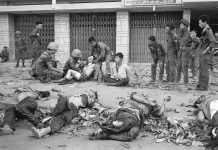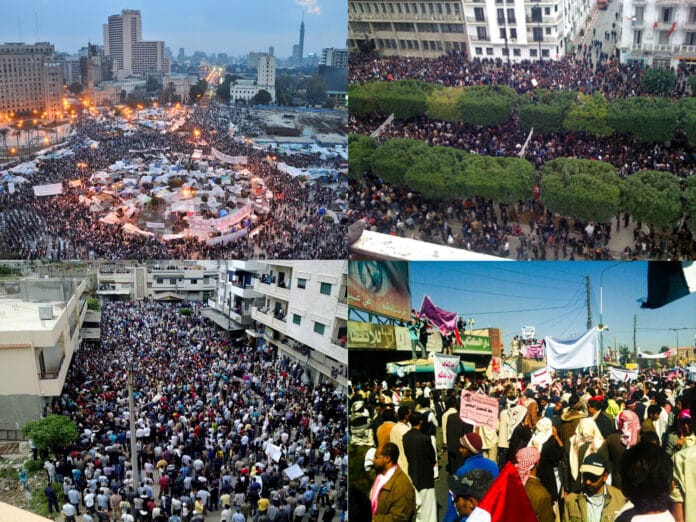
Linkbox med leksikalt, sites og artikler, som analyserer og diskuterer massedemonstrationerne og revolterne i Nordafrika og Mellemøsten foråret 2011.
Socialistisk Bibliotek, påbegyndt 2011,
revideret januar 2021.
Indhold
Se også på Socialistisk Bibliotek:
- Linkboxen: Oprøret i Tunesien, om den forudgående og inspirerende folkelige opstand i Tunesien.
- Linkboxen: Oprøret i Egypten, om det folkelige oprør vendt mod Mubaraks regime.
- Linkboxen: Opstanden i Libyen, om det væbnede oprør mod Gaddafis regime.
- Linkboxen: Yemen – Ungdommens revolution
- Tidslinjen: 15. marts 2011, om oprøret i Syrien.
- Tidslinjen: 14. februar 2011, om oprøret i Bahrain.
- Tidslinjen: Tilbageblik på året 2011, opstande, oprør og revolution
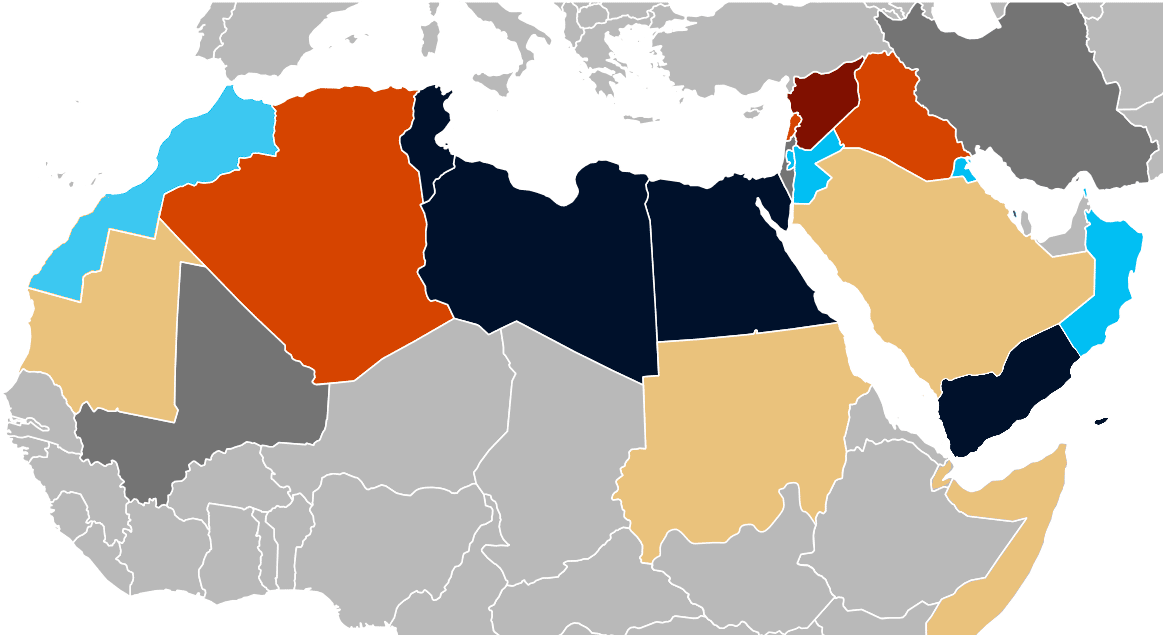

Protracted protests and repression
Change of government and protests
Protracted events
Minor protests
Non-Arab countries affected by a social movement simultaneously with the Arab revolts
Leksikale
- Protesterne i den arabiske verden 2010-2011 (Wikipedia.dk). Mindre oversigtsartikel på dansk.
- Arab Spring (Wikipedia.org). Længere artikel på engelsk.
Sites / Collections of articles
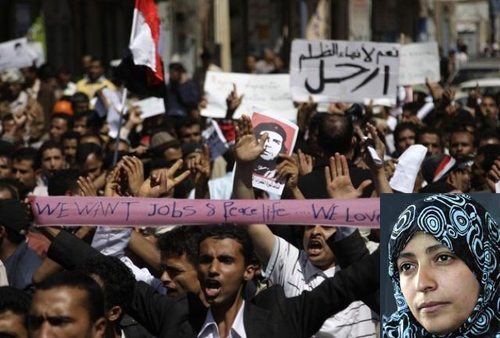
- The Guardian: Arab and Middle East unrest
- In Defence of Marxism: Topics: Arab Revolution
- International Viewpoint: Index: Middle East
- Al Jazeera: Spotlight: The Arab awakening
- MENA Solidarity Network: Solidarity with Workers in the Middle East
- Middle East Research and Information Project: Arab World
- Middle East Workers’ Solidarity: A website supporting workers’ organisations
- SocialistWorker.org (US): In Depth: Africa + Middle East
- World Socialist Web Site: Section: Middle East + Northern Africa
For nyere artikler, se nedenfor: Marxistarkiv.se, Socialistisk Information, Counterfire, International Socialism, Jacobin, Marxist Left Review, ROAR, Spectre, Tempest og Weekly Worker.
Artikler på dansk (og nordisk)
Autonom Infoservice
Arabiske kvinders kamp i skyggen af islamisternes valgsejre (24. januar 2012)
“Da revolten mod diktaturerne i Tunesien, Ægypten og Libyen startede for lidt over et år siden, indtog kvinderne en vigtig rolle. I Ægypten og Libyen var det kvinder, der kick-startede folkeopstanden.”
Information.dk
Myten om den islamistiske vinter. Af Olivier Roy (4. januar 2013)
“Egypten og Tunesien er ikke ved synke ned i kaos og fundamentalisme – de er blot i gang med at lære sig selv at blive demokratier.”
Frygt ikke den arabiske vinter. Af Olivier Roy (24. februar 2012)
Det Arabiske Forår var i modsætning til revolutionen i Iran ikke religiøst inspireret. De islamistiske valgsejre i Tunesien og Egypten indvarsler ikke en islamistisk kontrarevolution – demokratiseringen er irreversibel.”
Mellemøsten er trådt ind i de post-islamiske revolutioners tid. Af Olivier Roy (Information.dk, 18. februar 2011)
“Vestens vanetænkning har med opstandene i Nordafrika for alvor vist sig som forældet: Den arabisk-muslimske verden er ikke længere en undtagelse fra den verdenshistoriske hovedstrøm.”
Kritisk Debat
Vedrørende krigen i Libyen, det arabiske forår og de spørgsmål, som situationen rejser. Af Bjarne Mortensen (juni 2011). P.t. ikke online.
“Den revolutionære situation i den arabiske verden kom ved sit omfang og sin hurtighed bag på de vestlige lande, men det er nu indlysende, at disse landes ledende kredse ikke alene har taget højde for situationen, men tillige har igangsat en mangesidig offensiv med det formål at påvirke de forskellige arabiske landes hastige politiske udvikling i en retning, der garanterer vestlige interesser.”
Marxistarkiv.se
Den arabiska termidoren (pdf). Av Anand Gopal (12. oktober 2020, 29 s.)
“Artikel från Catalyst, sommaren 2020, som analyserar bakgrunden till och utvecklingen av ‘den arabiska våren’, och pekar på betydelsen av en klassanalys för att förstå händelserna.”
De arabiska revolutionerna ett år efteråt (pdf) (februar 2012, 10 s.)
“Intervju där Gilbert Achcar diskuterar det senaste årets revolter i arabvärlden, och hur framtiden kan tänkas bli.”
Om kedjan av händelser i arabvärlden (pdf). Av Perry Anderson (2011)
“Den arabiska revolten 2011 tillhör en sällsynt grupp historiska händelser: en kedja av politiska omvälvningar, där den ena får den andra att explodera över en hel region i världen. Det har funnits tre tidigare exempel på detta – det spansk-amerikanska befrielsekriget som inleddes 1810 och slutade 1825, de europeiska revolutionerna 1848-1849 och sammanbrottet för regimerna i Sovjetblocket 1989-1991.”
Modkraft.dk
Mellemøsten og truslen mod Vesten. Af Anders Lundkvist (11. april 2011)
“Det arabiske demokratiske oprør ligner en katastrofe for årtiers vestlig politik, dvs. interessevaretagelse. Det var næsten værre end opgøret med nyliberalismen i Latinamerika. Hvad kan der gøres? Krig i Libyen?”
POV International
Det Arabiske Forår er måske kun lige begyndt. Af Hans Henrik Fafner (18. august 2021). Anmeldelse af Oprør og alliancer: Mellemøsten efter det arabiske forår (Lindhardt og Ringhof, 2021, 400 s.) “Lars Erslev Andersen, seniorforsker ved DIIS, har skrevet om Det Arabiske Forår og situationen 10 år efter. Det er blevet en tour de force, hvor han med sikker hånd fører læseren frem til en forståelse af en af verdens mest komplicerede dele.”
Revolution
Revolutionære efterskælv. Af Alan Woods (22. februar 2011)
“Det revolutionære jordskælv i Egypten og Tunesien har sendt seismiske chokbølger til de mest afsides dele af den arabiske verden. Algeriet, Marokko, Libyen, Sudan, Bahrain, Irak, Yemen, Kuwait, Djibouti.”
Socialistisk Arbejderavis
Imperialisme og revolution i Mellemøsten: Baggrunden for Libyen-krigen (nr.309, 19. maj 2011). Uforkortet udgave online.
“Vesten har en lang og blodig historie i Mellemøsten. Richard Seymour afdækker, hvordan de seneste revolutioner har fremtvunget en ny strategi fra imperialistiske magter i deres forsøg på at styre regionen.”
Socialistisk Information
Sudans revolution ved en korsvej – et år efter Omar al-Bashirs fald. Af Gilbert Achcar (5. juli 2020)
“Sudan bevæger sig fra en græsrodsrevolution til en postrevolutionær regeringsstruktur og fra militær til civilt herredømme, og det sker i en verden, hvor protester er blevet sat på pause. Får revolutionen en hård landing?”
Pandemi og oliekrise kan få det Arabiske Forår til at vende tilbage med fornyet styrke (1. juni 2020)
“I dette interview diskuterer Mellemøst-eksperten Gilbert Achcar med den amerikanske journalist Ashley Smith hvordan priskrigen mellem de olieeksporterende lande i Mellemøsten har påvirket verden, de aktuelle revolutionære aktiviteter, som vil kunne føre frem til et nyt “arabisk forår” samt hvordan venstrefløjen i USA er nødt til genoplive den sande betydning af internationalisme.”
Algeriet, Sudan… årstiderne efter det arabiske forår (8. september 2019)
“De seneste opstande i Sudan og Algeriet har undgået fejltagelserne fra 2011, skriver Mellemøst-eksperten Gilbert Achcar i denne status over udviklingen i den arabiske verden, siden oprøret startede i 2011.”
Fire år efter: Den revolutionære proces fanget i reaktionens greb. Af Syria Freedom Forever (18. januar 2015)
“De revolutionære processer, som begyndte for snart fire år siden i Mellemøsten og Nordafrika, er slet ikke afsluttede, og deres oprindelige mål (demokrati, social retfærdighed og lighed) synes fjernere end nogensinde.”
Hele regionen koger (24. februar 2013)
Dette interview med Gilbert Achcar blev lavet i december 2012 af International Socialist Review (Issue 87, January 2013)
Arabiske revolutioner (26. marts 2012)
Farooq Sulehria interviewer Adam Hanieh “… om blandt andet Saudi Arabien og andre Golf-staters rolle som nøgleaktør i den bølge af modrevolutioner, der er blevet udløst mod oprørene.”
Islam og demokrati. Af Svend Vestergaard Jensen (10. september 2011)
“Islam er ikke hovedfaktoren i revolterne i den arabiske region. Sociale spørgsmål, arbejdsløshed, manglen på boliger og kampen mod undertrykkelse og magtmisbrug hos de herskende regimer er i centrum. Men islam er den absolutte dominerende religion i alle de lande, hvor oprørene finder sted.”
11. september, bin Laden, USA og de arabiske oprør: Risikoen for folkemagt. Af Gilbert Achcar (10. september 2011)
“De arabiske opstande har flyttet heltestatus fra Osama bin Laden til folket, et skifte, som kan slå tilbage mod USA. Stillet over for det arabiske folk og dets ønsker, kan Washington meget velkommen til at fortryde tabet af den belejlige fjende, som bin Laden udgjorde.”
Håb og forandringer i den arabiske verden (11. marts 2011)
“I dette interview diskuterer den libanesiske forfatter, socialist og antikrigs-aktivist Gilbert Achcar betydningen af den nuværende bølge af masseprotester i Mellemøsten.”
Se også Tema: Arabiske revolutioner
Videnskab.dk
Venstreorienterede arabere vender tilbage. Af Martin Ledstrup (3. februar 2012)
“Magten til folket! Mere lighed nu! Dansk forskning [ved Sune Haugbølle] viser, at der sker mere i arabisk politik end islamisme: venstrefløjen spirer i det arabiske forår.”
Articles in English
Against the Current
The first decade of the Arab revolutionary process. By Gilbert Achcar (September 2021)
“The greatest challenge facing the present generation of revolutionaries, who became politicized in the course of the uprisings, and the fundamental prerequisite for their ability to transition from uprising to successful revolution, lie in the aforementioned issue of leadership, in both its organizational and political dimensions.”
Roads to the Arab Uprisings. By Kit Adam Wainer (Issue 167, November-December 2013). Review of Jeanine Sowers and Chris Toensing (eds.), The Journey to Tahrir: Revolution, Protest, and Social Change in Egypt (Verso, 2012, 320 p.) + David McMurray and Amanda Ufheil-Somers (eds.), The Arab Revolts: Dispatches on Militant Democracy in the Middle East (Indiana University Press, 2013, 272 p.)
“Egypt, the font of modern Arab nationalism and political Islam, is the subject of The Journey to Tahrir. Sowers and Toensing have collected a strong group of essays on the political, cultural and historical backgrounds of the Egyptian revolt of 2011. The Arab Revolts is a regional collection allowing readers to compare the evolution of protest movements in five Arab countries.”
Can people get what they want? – an interview with Gilbert Achcar (Issue 166, September-October 2013)
Gilbert Achcar is the author of the newly published The People Want. A Radical Exploration of the Arab Uprising (University of California Press, 2013). He was interviewed by phone on August 6, 2013 by David Finkel of the ATC editorial board.
See reviews by Lance Selfa (International Socialist Review, Issue 98, Fall 2015) + Sam Dathi (Counterfire, 28 March 2014) + Louis Proyect (The Unrepentant Marxist, March 21, 2014) + Farooq Sulehria (Socialist Resistance, December 8, 2013)
Egypt’s year of revolution: an interview with Carl Finamore (Issue 158, May-June 2012)
“Carl Finamore went on a reporting trip to Egypt for ten days in 2011. He arrived on February 11, 2011, the day President Hosni Mubarak was deposed. He visited for another ten days in 2012, on the one-year anniversary of the 18-day revolt that began on January 25, 2011. On both occasions, he travelled to Egypt with letters of introduction from his union and the San Francisco Labor Council.”
The Arab Spring, the West and Political Islam. By Hisham H. Ahmed (Issue 156, January-February 2012)
“In conclusion, the Arab world is undergoing a process of massive transformation, necessitated by profound feelings of many years of humiliating national, regional and international injustices, Western-supported corruption and subjugation.”
Egypt’s Unfinished Revolution: an interview with Atef Said (Issue 156, January-February 2012)
“Atef Said is a Ph.D candidate in sociology at the University of Michigan-Ann Arbor. A human rights lawyer and a political activist in Egypt before moving to the United States in 2004, he is the author of two books (in Arabic) on torture under Mubarak. Said was interviewed on December 2 by David Finkel.”
The unfolding Arab uprisings. Suzi Weissman interviews Mark LeVine (Issue 152, May-June 2011)
“Mark LeVine was in Bahrain, just over a week ago, as the Saudis sent in over a thousand troops to quell the protests there. He’s a professor of history at University of California, Irvine.”
Catalyst: A Journal of Theory and Strategy
The Arab Spring, a decade later ( Vol.4, No.3, Fall 2020)
“Jeff Goodwin recently spoke with Achcar about recent developments and his views of the revolutionary process that began in 2011.”
Catalyst Review
Culture can’t explain the Arab revolts. By Helen Lackner (October 13, 2023)
Review of Benoit Challand’s book (Cambridge University Press, 2023, 304 p.): “Violence and Representation in the Arab Uprising shows how the Arab revolts empowered democratic citizenship. But a focus on vibrant cultural creativity is no substitute for concrete analysis of political agency and economic structure.”
Counterfire
The Arab Spring ten years on: “The people demand the fall of the regime!” (January 30, 2021)
“Susan Ram salutes the millions who set North Africa and the Middle East aflame …The astonishing spread of these upheavals, and their speed of travel, is without precedent in recent times.”
No way to remember anything. By Kevin Crane (September 8, 2016). Review of Samir Amin, The Reawakening of the Arab World: Challenge and Change in the Aftermath of the Arab Spring (Monthly Review Press, 2016, 240 p.)
“Unfortunately, it is not a good book, in fact it is one that reproduces some of the most unhelpful ideas surrounding Middle-Eastern politics imaginable.”
Revolution and counter-revolution in the Arab world (December 23, 2011)
“To mark one year since the start of popular protests in Tunisia, Joseph Daher, co-author of ‘The People Demand: a short history of the Arab Revolutions’, examines the continuing Arab revolutions and the challenges they face.”
Where does Al Jazeera stand? (5 October 2011)
“Joseph Daher looks at the role of Al Jazeera as both a tool of Qatar’s political and economic interests, but which also sometimes shares sympathy with popular movements in the region.”
Imperialism and the Arab Revolutions (6 September 2011)
“In this extract from their new book The People Demand, John Rees and Joseph Daher consider the relationship between US imperialism and the popular uprisings across the Arab world.”
Arab revolutions and the democratic spring. By James Foley and Pete Ramand (27 June 2011)
“The Arab Spring has challenged American hegemony and fostered a new international consciousness where a democracy of the streets and the city squares challenges the low-intensity democracy of financialised capitalism.”
CounterPunch
Whatever happened to the Arab Spring? Revolution vs. counterrevolution. By Ismael Hossein-Zadeh (April 13-15, 2012)
“Caught off-guard by the initial wave of the Arab Spring in Egypt and Tunisia, the US and its allies struck back with a vengeance. They employed a number of simultaneous tactics to sabotage the Arab Spring.”
The economics of the Arab Spring. By Richard Javad Heydarian (April 28, 2011)
“Though many factors are contributing to the historic changes that are sweeping across the region, a combination of decades of aggressive economic liberalization and political repression has played a crucial role in mobilizing the masses against the hand of autocracy.”
Taking stock of the Arab revolutions. By Esam Al-Amin (March 18-20, 2011)
“It is remarkable how in a relatively short period of time – three months – the entire Arab World has been transformed from a static and bleak political status quo to a dynamic and lively force for far-reaching change. Hence, it is prudent to take the time to assess the political sea change across the Arab world in the past few months.”
In Defence of Marxism
One year since Bouazizi’s death: one year of Arab Revolution. By Hamid Alizadeh (16 December 2011)
“One year ago, Mohammad Bouazizi, a young Tunisian fruit vendor, driven by desperation, poverty, and anger, set himself on fire in the city of Sidi Bouzid. The revolutionary wildfire that began after his death – first in southern Tunisia, then the entire country, then erupting across the entire Arab-speaking world – marked a turning point in human history.”
The International Marxist-Humanists
Arab revolutions at the crossroads. By Kevin Anderson (April 2, 2011)
“The revolutions in Tunisia, Egypt, and the uprising in Libya have exhibited a post-Islamist and post-nationalist character. After challenging both the political and the economic order, they face dangers from old forces like the military and the Islamists (Egypt) or of violent repression (Libya).”
International Socialism
Ten years since the Arab revolutions: Middle Eastern voices reflect on a rebellious decade. By Anne Alexander (Issue 170, Spring 2021, p.17-33)
“To mark the tenth anniversary of the first wave of uprisings in 2011, we asked activists from Egypt, Syria, Sudan and Algeria about the strategic lessons revolutionaries should draw from these mobilisations.”
Class, power and revolution in Sudan. By Anne Alexander (Issue 166, Spring 2020)
“This article argues that the strategic power of class as a weapon in the hands of workers has the ability to transform political revolt and social discontent into social revolution.”
The roots of Algeria’s crisis. By Gianni Del Panta (Issue 166, Spring 2020)
“In this article, I will argue that the mobilisation of these different sectors of society should be understood with the aid of the insights offered by the theory of Uneven and Combined Development (UCD).”
Living on revolution time: understanding the dynamics of the uprisings in Sudan and Algeria. By Anne Alexander (Issue 163, Summer 2019)
“This article proposes three areas of analysis and three questions of strategy where the revolutionary socialist tradition has a distinctive contribution to make.”
The contemporary dynamics of imperialism in the Middle East: a preliminary analysis. By Anne Alexander (Issue 159, Summer 2018)
“The development of a sub-imperial system in the Middle East has to be understood first and foremost through the lens of inequality between competing capitals and ‘their’ states.”
Understanding the counter-revolution. By Jad Bouharoun (Issue 153, Winter 2017, p.149-165). Review of Gilbert Achcar, Morbid Symptoms: Relapse in the Arab Uprising (Saqi, 2016, 228 p.). “His book is meant to constitute a follow-up to his earlier analysis of the Arab revolutions, The People Want. See also review by Atef Said: Arab Spring: Against shallow optimism and pessimism (Against the Current, Issue 187, March-April 2017)
Capital and resistance in the Middle East. By Anne Alexander (Issue 143, Summer 2014). Review of Gilbert Achcar, The People Want: A Radical Exploration of the Arab Uprising (Saqi, 2013) + Adam Hanieh, Lineages of Revolt: Issues of Contemporary Capitalism in the Middle East (Haymarket, 2013, 274 p.)
Spectres of counter-revolution. By Alex Callinicos (Issue 140, Autumn 2013)
“Counter-revolution now haunts the Arab world. But it takes diverse and confusing shapes.”
The return of the Arab revolution. By Alex Callinicos (Issue 130, Spring 2011)
“The Arab revolitions are rewriting the political map of the Middle East and renewing the very idea of revolution itself. An extended analysis that seeks to situate the revolutions in the context of the global crisis.”
International Socialist Review
Marxism, the Arab Spring, and Islamic fundamentalism . By Joseph Daher (Issue 106, Fall 2017, p.90-113).
“… Islamic fundamentalist movements have to be understood as a fundamentally reactionary political force throughout the region. This counterrevolutionary role necessitates a reevaluation of much of the Left’s analytical understanding of, and strategic approach to, Islamic fundamentalism.”
Islamic fundamentalism, the Arab Spring, and the Left (Issue 103, Winter 2016-17)
“Ashley Smith interviewed Gilbert Achcar about one of the pressing questions raised by the Arab Spring … the Left’s understanding of, and approach to, Islamic Fundamentalism.”
Underlying the uprisings. By Andrew Pollack (Summer 2014, a web-exclusive). Review of Adam Hanieh, Lineages of Revolt: Issues of Contemporary Capitalism in the Middle East (Haymarket, 2013, 274 p.)
“Adam Hanieh has written the essential work for understanding the current political economy of the Middle East and North Africa, and for explaining the political tasks that flow from that understanding.”
All the region is boiling (Issue 87, January 2013). Interview with Gilbert Achcar.
“The most general comment to make is that, for the first time in the history of the region, things are really moving and changing, and changing very fast at that, so that the region entered what I call a long-term revolutionary process.”
Imperialism, the Arab Spring, and the crisis (Issue 81, January-February 2012).
“David Barsamian interviews Tariq Ali. an internationally renowned writer and activist, who was born in Lahore, Pakistan. For many years he has been based in London where he is an editor of New Left Review.”
International Viewpoint
What happened to the Arab Spring? (Issue 491, December 2015). Nada Matta interviews Gilbert Achcar.
“Today marks the fifth anniversary of the start of the Arab uprising. Sparked in Tunisia on December 17, 2010, a wave of revolutionary contagion spread across the Arab world … Five years into the uprisings, however, counterrevolutionary forces composed of the old regimes and Islamic fundamentalist forces have regained the political initiative, and are now violently vying for control.”
Revolutions are not over (Issue 445, February 2012). Farooq Sulehria interviews Adam Hanieh.
“Saudi Arabia, along with other Gulf states, have been key protagonists in the counter-revolutionary wave unleashed against the uprisings … The outcome of elections in Tunisia and Egypt went in favour of Islamist parties even if the revolutions in these countries had a secular character. They are also an integral part, if not the dominant force, in the revolutions in Syria, Libya, Yemen, and Bahrain. Is the Arab Spring in fact a victory for the Islamist movements?”
Theses on the ‘Arab Spring’. By Gilbert Achcar (Issue 445, February 2012)
“At a time when progressive political forces had gradually lost all their sources of state support and funding, religious fundamentalist forces had been funded and sustained over the whole region by three regional oil-rich states, which competed in pouring money to them: the Saudi kingdom, the Islamic Republic of Iran and the emirate of Qatar.”
The revolution continues. By Gilbert Achcar (Issue 442, November 2011)
“While voices were being raised from the right, and part of the left, declaring the ‘Arab Spring’ over and advising the rebellious masses to go back home, recent days have made it abundantly clear that the revolutionary process which was sparked in Tunisia late last year remains alive and well.”
9/11, bin Laden, the USA and the Arab uprisings: The perils of people power. By Gilbert Archcar (Issue 440, September 2011)
“The Arab uprisings have shifted hero status from Osama bin Laden to the people, a shift that could backfire on the United States.”
‘The revolution has just begun’ (Issue 439, August 2011)
“The journal Al-Akhbar interviewed Gilbert Achcar on the current stage of the Arab revolutions in June 2011. The translation and introduction we publish here were published in their English-language edition on 24 August 2011.”
The Arab revolutions in perspective (Issue 439, August 2011)
“This interview with Gilbert Achcar, who is currently working on a book on the Arab revolutions, was conducted by Yvan Lemaitre, and published in the newspaper of the French NPA on July 28, 2011.”
The heartbeat of the Arab revolutions. By Josep Maria Antentas and Esther Vivas (Issue 436, May 2011)
“Much has been written already about the revolutions in the Maghreb and the Arab world and their historical significance. Less emphasis has been placed, however, on the relevance they have for the European left.”
Jacobin
Everyday resistance is not an alternative to politics. By Nihal El Aasar (Jacobin, May 30, 2023)
Review of Asef Bayat, Revolutionary Life: The Everyday of the Arab Spring (Harvard University Press, 2021). “Following the defeat of the Arab Spring, leftists were quick to look for consolation in the small acts of resistance that took place during the revolt. This optimism was misplaced. In order to enact change, the Left must seize the levers of power.”
The remaking of the Arab working class (August 8, 2021)
Daniel Finn interviews Joel Beinin: “Once powerful Arab left-wing movements took a battering in recent decades, but they’ve reemerged since 2011 to play a vital role in struggles for freedom and social justice. Rebuilding strong labor organizations is crucial for democracy in the Middle East.”
Why the Arab Springf failed (November 23, 2020)
Meagan Day and Micah Uetrich interviews Anand Gopal: “As inspiring as the Arab Spring uprisings of the early 2010s were, they failed to democratize the Middle East. The primary cause had little to do with the region’s cultural or religious characteristics and everything to do with the profound weakening of the Middle East’s working-class power under neoliberalism.”
Arab workers and the struggle for democracy. By Joel Beinin (May 10, 2020)
“Since 2011, Arab labor organizations and left parties have been central to movements for democracy and social justice in the Middle East. Frequently overlooked in Western media coverage, from Egypt and Tunisia to Algeria and Sudan, they’ve carried on this fight against tremendous odds.”
Jadaliyya.com
New texts out now: The Dawn of the Arab Uprisings: End of an Old Order? (November 15, 2013)
Interview with Bassam Haddad, Rosie Bsheer, and Ziad Abu-Rish about their book (Pluto Press, 2012). Se Michael Irving Jensens anmeldelse: Jadaliyya bringer optimismen tilbage (Information.dk, 9. februar 2013)
John Molyneux
Islamophobia, the left and the Arab Spring (August 24, 2012)
” In view of all this it was to be hoped that what became known as the Arab Spring – the series of revolutions and revolts that began with the Tunisian and Egyptian revolutions in early 2011 would work to undermine Islamophobia by changing the frame of reference within which Arab and Muslim people were perceived.”
Logos: A Journal of Modern Society & Culture
Four years after the Arab Revolutions: fighting on amid reactionary retrenchment. By Kevin Anderson (Vol.14, No.2-3, Summer 2015)
“Overall, the situation in the Middle East today is one of counter-revolution and retrogression … At the same time, we have seen a few green shoots that point – amid all the carnage, repression, and imperialist maneuvers – in the direction of an emancipatory future.”
Marx & Philosophical Review of Books
The Reawakening of the Arab World. By Jared Bly (4 November 2016). Review of Samir Amin, The Reawakening of the Arab World: Challenge and Change in the Aftermath of the Arab Spring (Monthly Review Press, 2016, 240 p.)
“Samir Amin’s latest book on the revolutionary foments in the Arab world provides a timely voice in contrast to the obfuscated discourse of the Western media regarding the Arab Spring and its ensuing political developments.”
Marxist Left Review
Gilbert Achcar on the undying revolutions in the Middle East and North Africa (Issue 19, Summer 2020)
“In this wide-ranging interview, Gilbert Achcar explores the issues raised by the inspirational return of revolution to the Middle East and North Africa.”
The social construction of sectarianism in the Middle East (Issue 17, Summer 2019)
“Omar Hassan outlines a materialist explanation of sectarian conflict in the Middle East, arguing that true social liberation is bound up with the abolition of capitalism in the region.”
Middle East Report
Revolutionary Afterlives (Issue 301, Winter 2021). “The issue considers the ongoing political struggles throughout the region, 10 years after the Arab Uprisings. Rather than tally wins and losses across countries, this issue examines what lessons might have been learned and not learned, and it uniquely focuses on emerging new solidarities in social movements around the region.”
Putting workers on the map. By Peyman Jafari (Issue 300, Fall 2021). “MERIP’s reporting on labor would become one of the hallmarks of its political economy approach.” With links to many MERIP-articles.
Revisiting MERIP coverage of the Arab Uprisings (January 26, 2021). “As we reflect on the previous decade and consider what lies ahead, MERIP’s collection of articles remains an invaluable resource.”
Between terror and tyranny: Political Islam in the shadow of the Arab Uprisings. By Abdullah Al-Arian (December 30, 2015)
“… the Society of Muslim Brothers and movements inspired by its ideology across the region find themselves in as precarious a position as any they have faced in the past half-century.”
Le Monde Diplomatique
‘Neither with the West, nor against it’: The new Arab awakening. By Alain Gresh (March 2011)
“The upheavals taking place across the Arab world have implications not just for the region but the world. As the United Nations attempted to calm the situation in Libya, the US told Gadafy it was time to go. While the EU fears mass immigration from Libya, the US faces the impact on the regional order of the fall of Mubarak, pillar of US policy across the region, from the Israeli-Palestinian conflict to Iran.”
Monthly Review
An Arab springtime? By Samir Amin (Vol.63, No.5, October 2011)
“The year 2011 began with a series of shattering, wrathful, explosions from the Arab peoples. Is this springtime the inception of a second ‘awakening of the Arab world’?”
New Politics
“We’re facing an important crossroad” (January 26, 2015)
“Lebanese author Gilbert Achcar says the third revolutionary phase must be free of religious radicalism.”
New Left Review
Making and unmaking of the Greater Middle East (Issue 101, September-October 2016)
“Kevan Harris traces changing state formations and social compacts, from decaying Ottoman and Safavid empires, through colonization and postwar corporatism to infitah, authoritarian retrenchment and military intervention.”
Revolution in bad times. By Asef Bayat (Issue 80, March-April 2013)
“Euphoric celebrations of the Arab uprisings have skated over their profoundly ambiguous character. Asef Bayat explains the failure to make a clean sweep of the old order in terms of a self-limiting programme that stems from the discredit of traditional revolutionary models.”
Between past and future (Issue 80, March-April 2013)
“Responding to Asef Bayat, Tariq Ali argues that any adequate analysis of the outcomes of the Arab Spring must reckon with Washington’s tight defence of its interests in the region. The dynamics of the revolts located in a long history of Western intervention.”
Arab revolts and nation-state crisis. By Kees van der Pijl (Issue 70, July-August 2011; online at Kasama Project)
“The triple crisis – of Western hegemony, of capital and of the nationstate form – within which the Arab uprisings of 2011 have unfolded, and longer-run history of Anglo-American strategies for containing popular aspirations to sovereignty.”
On the concatenation in the Arab world. By Perry Anderson (Issue 68, March-April 2011)
“From Tunis to Manama, 2011 has brought a chain-reaction of popular upheavals, in a region where imperial domination and domestic despotism have long been entwined. A call for political liberty to reconnect with social equality and Arab fraternity, in a radical new internationalism.”
New Socialist
Revolutionary hope and change across the ‘Arab World’: 10 questions with Gilbert Achcar (March 1, 2011)
“In this interview, Gilbert Achcar discusses the significance of the ongoing revolutionary wave of mass protests occuring across the Middle East with one of the New Socialist webzine editors Ali Mustafa.”
Red Pepper
Broken Spring? (April 22, 2012)
“Sami Ramadani argues that counter-revolution has gained the upper hand in Syria and across the Arab world.”
After the Spring (June 2011)
“Sami Ramadani considers the response to the popular uprisings from the region’s dictators and other reactionary forces, as well as the role of imperialism.”
Review of African Political Economy
A year of revolt. By Emma Wilde Botta (November 17, 2020)
Review of Jade Saab (ed.), A Region in Revolt: Mapping the Recent Uprisings in North Africa and West Asia (Daraja Press, 2020, 178 p.). “Last year a wave of militant protests spread across North Africa and West Asia, in a sustained, historic series of popular struggles.” See also review by Sam Salour: Sudan and the second spring (Tempest, December 22, 2020).
ROAR Magazine
More than just a ‘Spring’: the Arab region’s long-term revolution (November 8, 2019) Interview with Gilbert Achcar: “The Arab region is immersed in a long-term revolutionary process that pits youth-led movements against authoritarian rulers and neoliberal capitalism.”
Socialism Today
The revolutionary year in North Africa and the Middle East. By Peter Taaffe
(Issue 155, February 2012)
“Within weeks of the overthrow of Tunisian dictatorship in January 2011, Mubarak’s regime was on its knees in Egypt – the most populous Arab state, backed to the hilt by western imperialism. A revolutionary wave swept across North Africa and the Middle East, inspiring movements throughout the world. But what is the situation now?”
Socialist Review
Reformism, islamism & revolution (Issue 406, October 2015)
“The crackdown on the Muslim Brotherhood by general Sisi’s counter-revolutionary regime has generated much debate on the Egyptian left about how to relate to Islamists. Anne Alexander argues that we must recognise the tensions within such organisations and work with their members.”
Imperialism and the new wars in the Middle East (Issue 402, May 2015)
“The decline of US imperialism in the Middle East is fuelling rising tensions between Saudi Arabia and Iran. Simon Assaf looks at the region as it plunges deeper into violence and uncertainty.”
Class, power and the state in the Arab Spring (Issue 387, January 2014)
“This month marks the third anniversary of the start of the Egyptian revolution. Simon Assaf examines some key lessons while Anne Alexander spoke to three Egyptian revolutionaries.”
Workers and the Arab revolutions. By Anne Alexander (Issue 386, December 2013)
“Over the next three months Socialist Review will be exploring the politics and development of these popular revolts. Anne Alexander open this series with an assessment of the nascent workers’ movements in Egypt and Tunisia.”
A region transformed. By Simon Assaf (Issue 371, July 2012)
“To understand the origins of the revolutions we have to look into the social changes that have taken place in the region over the past few decades, changes that the old regimes were incapable of adapting to, either through reforms, or by neoliberal economic policies they enthusiastically embraced.”
The Arab Spring. By Jack Farmer (Issue 369, May 2012). Review of Hamid Dabashi, The Arab Spring: The End of Postcolonialism (Zed Books, 2012)
“Hamid Dabashi’s latest book is a joyful celebration of the ongoing revolutions and uprisings across the Middle East and North Africa. It deserves to be read by anyone with even a passing interest in what must surely rank as the most important series of events in our time.”
An Arab 1848? By Mark L Thomas (Issue 368, April 2012)
“In 1848 popular revolutions swept across Europe. The lessons from these events can help us to understand the revolutions in the Middle East today.”
Revolution, sanctions and US imperialism (Issue 366, February 2012)
“Sarah Ensor and Mark L Thomas spoke to Tariq Ali who gives his take on the revolutions and rebellions in Tunisia, Egypt and Syria, the threat of war with Iran and US imperialism after Iraq.”
Imperialism and revolution in the Middle East (Issue 358, May 2011)
“Richard Seymour looks at the way in which the revolutions in the Middle East and North Africa have provoked Western powers to adopt a new strategy to try to maintain their power in the region.”
Socialist Worker
All power to Sudan’s resistance committees? (8 January 2022)
Long Reads: “In Sudan’s revolution over 5,000 resistance committees mobilise opposition to the generals and step in to meet people’s everyday needs. Anne Alexander asks if the grassroots bodies could become alternative organs of political power to the present capitalist state.”
Palestine and the Arab Revolutions (Issue 2291, 25 February 2012)
“Jonathan Maunder looks at how Hamas, Fatah and Israel have reacted to regional uprisings.”
2011’s rising tide of revolution – and historical patterns of revolt (Issue 2255, 11 June 2011)
“John Molyneux looks at this year’s revolutions, their significance and how they compare to patterns of revolt through history.”
SocialistWorker.org
The fire of revolution still burns (January 16, 2014)
Gilbert Achcar spoke with Eric Ruder in December on the eve of the third anniversary of the Arab uprisings: “Three years since the Arab Spring, the uprisings across the Arab world have endured setbacks, but the flame of the revolt is far from extinguished.”
Spectre
An unfinished epoch of revolution: 10 years after the “Arab” Revolutions. By Joseph Daher (Spectre, January 26, 2021)
“The outbreak of the revolutionary process in the Middle East and North African (MENA) region over the last decade is part of these major and groundbreaking events in human history. There is no doubt that the first wave of revolts in 2011 marked the opening of an unfinished epoch of revolution and counter-revolution.”
STRATFOR
Re-examining the Arab Spring. By George Friedman (August 15, 2011)
“It is now more than six months since the beginning of the Arab Spring, and it is important to take stock of what has happened and what has not happened … It is important to begin with the fact that, to this point, no regime has fallen in the Arab world.”
Revolution and the Muslim world. By George Friedman (February 22, 2011)
“The key principle that appears to be driving the risings is a feeling that the regimes, or a group of individuals within the regimes, has deprived the public of political and, more important, economic rights – in short, that they enriched themselves beyond what good taste permitted.”
Tempest
The first decade of the Arab revolutionary process (Tempest, December 22, 2020)
“Gilbert Achcar reflects on the tenth anniversary of the start of the Arab Spring, its lessons, and the ongoing process which continues to this day.”
Truthout
Pandemic and oil crisis could make Second Arab Spring return with a vengeance (May 6, 2020)
“In this interview, Gilbert Achcar discusses with Ashley Smith how Middle Eastern oil-exporting countries’ price war has impacted the world, the ongoing revolutionary actions that could result in a ‘Second Arab Spring’ and how the U.S. left must revive the true meaning of internationalism.” In Danish: Pandemi og oliekrise kan få det Arabiske Forår til at vende tilbage med fornyet styrke (Socialistisk Information, 1. juni 2020)
Weekly Worker
Second Arab spring? (Weekly Worker, Issue 1274, 5 November 2019)
“As demonstrators once again take to the streets, Yassamine Mather looks at the issues involved.”
Mainspring of the Arab revolt. By Moshé Machover (Issue 992, 9 January 2014). Review of Adam Hanieh, Lineages of Revolt: Issues of Contemporary Capitalism in the Middle East (Haymarket Books, 2013, 273 p.). See also interview with Adam Hanieh (Jadaliyya.com, January 8, 2014)
“This book ought to be read – or, better, studied – by every socialist interested in the Middle East. On second thoughts, cut out the last five words; that part of the world is of vital interest to every socialist.”
Theses: The Arab awakening and Israel-Palestine (Issue 872, June 30, 2011)
“Communists recognise that the democratic revolution has not really happened anywhere in the Arab world. Some presidents may have gone. But the old regimes remain largely intact. We support those who are fighting for a real, thoroughgoing revolution that clears away all the muck of oppression.”
See also Debate: Assessing the significance and prospects of revolution (Issue 872, June 30, 2011)
Global crisis and Arab awakening (Issue 869, June 9, 2011)
“A roundtable discussion on the recent Middle East upheavals, featuring Mohammad Reza Shalgouni (Rahe Kargar/Organisation of Revolutionary Workers of Iran), Mike Macnair (CPGB), Moshé Machover (Israeli socialist) and Yassamine Mather (Hopi).
The long road to the Arab revolution. By Moshé Machover (Issue 859, March 31, 2011)
“What I would like to do is to initiate a discussion and explore some ideas about where the revolution is going, and what we should expect in both the short term and longer term.”
World Socialist Web Site
Gulf allies: A record of repression and torture, Part 1: Saudi Arabia (20 April 2011) + Part 2: Qatar (22 April) + Part 3: Bahrain (25 April) + Part 4: Kuwait (27 April) + Part 5: Oman (29 April) + Part 6: United Arab Emirates (3 May)
“The US State Department recently released its ‘2010 Country Reports on Human Rights Practices’. Included are reports on the member countries of the Gulf Cooperation Council (GCC), which represents the US-backed monarchies of Saudi Arabia, United Arab Emirates, Bahrain, Oman, Qatar and Kuwait.”
Global forces driving Middle East uprisings. By Nick Beams (5 March 2011)
“The most obvious common feature of Tunisia, Egypt and Libya – the three principal storm centres so far – is that a far-reaching program of neo-liberal “free market” restructuring has taken place in all of them in the recent period.”
ZNet
The revolution continues. By Gilbert Achcar (November 29, 2011)
“The revolution continues everywhere, defying attempts to abort it or divert it from its progressive and liberating course.”
The revolution has just begun. Interview with Gilbert Achcar (August 31, 2011)
“Gilbert Achcar has no qualms calling the popular protests sweeping the Arab world a revolution. They are, in his view, part of a revolutionary process that is taking the region into uncharted territory. The forces active on the ground have changed, and, while the future is unpredictable, there is no going back to the previous situation.”
See also
How the West remade the Middle East (Jacobin, March 22, 2024)
Daniel Denvir interviews Ussama Makdisi: “Western media often characterizes the Middle East as a region eternally riven with sectarian conflicts. In an interview, historian Ussama Makdisi says this is wrong, starting with the fact that the region has a rich history of multiethnic coexistence.”
Imperialism in the Middle East. By Anne Alexander (International Socialism, Issue 159, Summer 2018, p.17-35)
“The development of a sub-imperial system is predicated on the emergence of centres of capital accumulation outside the historic core of the capitalist system …”
The problem of the Middle East: (Egypt, Palestine, Syria, Lebanon and Iraq)
By Tony Cliff (unpublished manuscript, 1946; published at the Marxists Internet Archive, June 2011)
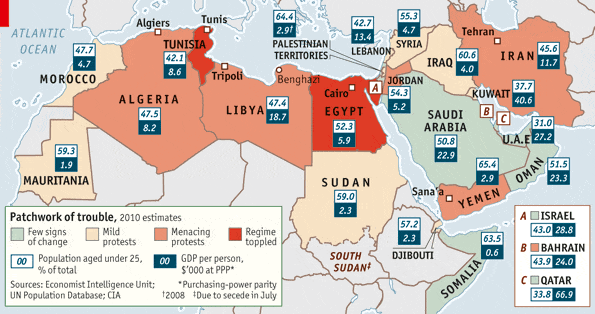


















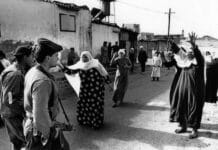
![George Habash square [Tulkarem?], Taken on 7 April 2011, Source: https://www.panoramio.com/photo/50717122. Author: Mujaddara. (CC BY-SA 3.0)](https://socbib.dk/wp-content/uploads/2007/05/George_Habash_sq_-_panoramio-218x150.jpg)

